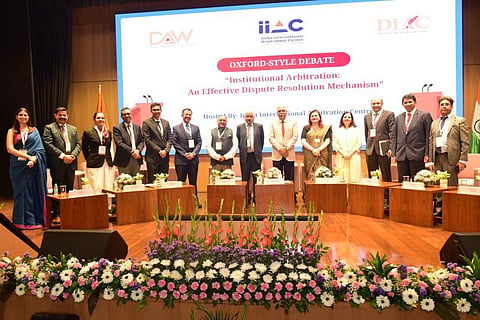
- Latest Legal News
- News
- Dealstreet
- Viewpoint
- Columns
- Interviews
- Law School
- Legal Jobs
- हिंदी
- ಕನ್ನಡ

The Delhi Arbitration Weekend (DAW) witnessed an Oxford Style debate on whether institutional arbitration is the complete solution to restore public sector undertakings’ (PSUs) confidence in arbitration.
The discussion, hosted by the India International Arbitration Centre at the Delhi High Court, pitted senior lawyers against one another in a spirited exchange.
The jury comprised Chief Justice Devendra Kumar Upadhyaya former Supreme Court Justice Hemant Gupta and Law Secretary Anju Rathi Rana.
The motion was argued in favour by Senior Advocates Dhyan Chinnappa and Rajshekhar Rao, along with Advocate Manini Brar, who emphasised the discipline, consistency and credibility that institutional arbitration could bring to PSU disputes.
Opposing them were Senior Advocates Akshay Bhan and Jayant Mehta, and Advocate Payal Chawla, who contended that institutional processes were no panacea and that PSUs, facing systemic disincentives and costly delays, were better off turning to litigation.
Chinnappa opened for the motion with a critique of ad hoc arbitration, recalling case studies where awards were made without evidence and tribunals acted arbitrarily. He described such decisions as “feeling arbitrations” and warned that PSUs, which account for 70% of arbitration in India, were losing faith.
“Ad hoc arbitration is out of the question. Going back to courts is not an option,” he said.
Rao argued that institutions could restore credibility by insulating PSU officers from the constant risk of vigilance and audit scrutiny.
“Institutions help build processes. Processes create consistency, and consistency builds confidence,” he noted.
Brar added that institutional rules impose discipline on timelines:
“You know when an arbitration will get over — that certainty itself is a cost saving.”
Countering the motion, Bhan urged a return to the courts, describing institutional arbitration as “old wine in a new bottle.”
“Forget arbitration. Go back to court. We’ve had enough of ad hoc and institutional alike,” he said, arguing that PSUs saw litigation as safer and more predictable.
Mehta questioned whether institutions really delivered better outcomes.
“If an award is bad, it is bad irrespective of whether it comes from an institution or an ad hoc tribunal. Institutional rules cannot immunise awards from interference or delay,” he remarked.
Chawla highlighted the systemic disincentives within PSU structures:
“The safest bureaucratic choice is always to appeal, regardless of merit. Without policy reform, no institution can change that."
Chief Justice Upadhyaya summed up the dilemma with unusual candour.
“Most of us sitting here voted for the motion. What does it indicate? The PSUs are going away from arbitration. What does it indicate? That the present system of ad hoc arbitration is perhaps not working to the satisfaction of the participating parties in the arbitration process,” he observed.
He then pointed to the contradiction between legislative intent and government policy:
“It is Parliamentary enactment enacted by the Government of India. It is all for promotion of arbitration process. We keep on hearing day in and day out that India needs to become an arbitration hub. So, thirst in this area and then the government’s ratification asking the PSUs to back out from arbitration. So, this dichotomy needs to be solved."
Justice Gupta noted that his experience as a co-arbitrator highlighted the failures of ad hoc processes.
“One arbitration started in 2012. The matter is still pending. Ours is the third tribunal. That is the stage of ad hoc arbitration."
As chair of an arbitral institution, he clarified his leaning:
“It is my duty and responsibility to support the motion…The attempt must be to restore confidence of PSUs. Ad hoc arbitration is not inspiring that confidence.”
Rana focused on the broader lessons for India’s arbitration system:
“What struck me the most is that it surfaced the questions that matter most for India’s arbitration ecosystem. How do we build trust? How do we expand access? And how do we ensure quality in every award that is delivered? The truth, ladies and gentlemen, always lies in the balance.”